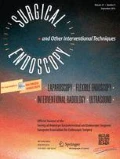Abstract
Background: A variety of parameters can affect the outcome of laparoscopic colorectal surgery. All consecutive laparoscopic colorectal procedures (LCP) were analyzed in an attempt to define an operative time curve for different categories of procedures. Additionally, impacts of case number and procedure type on length of procedure were assessed.
Methods: Our computerized data system was reviewed for all patients who underwent LCP in a 4-year period. Parameters reviewed included age, sex, surgical indications, procedures performed, length of procedure, intraoperative and postoperative complications, incidence and causes for conversion, duration of postoperative ileus, and hospital stay.
Results: Between August 1991 and December 1995, 175 patients with a mean age of 48.4 (range 15–88) years underwent LCP. Patients were divided chronologically into five consecutive groups. Procedures were classified as either basic or complex. Complex procedures were those in which there was either a fixed tumor, an abscess or fistula, or extensive intraabdominal adhesions from prior surgery. Complex procedures performed each year ranged from 37% to 66%. As well, the percentage of patients with adhesions increased from 17% in 1991 to 29% in 1995. Despite increased difficulty, the intraoperative complication rate fell significantly from 29% in 1991 to 8% in 1995 (p < 0.005). Additionally, the operative length decreased from a mean of 201 min in 1991 to a mean of 141 min in 1995 (p < 0.05).
Conclusion: The rapid improvement in these parameters may reflect both ascents in the learning curve and change in type of procedure. Adhesions, due to prior surgery or inflammation making dissection tedious, is the most important technical factor which effects operation time (p < 0.001). However, despite increased complexity, operating time decreased, reflecting improved skills. Thus, the experienced laparoscopic surgeon can increase the spectrum of applications with expectations of shorter operations and lower complication rates.
Similar content being viewed by others
Author information
Authors and Affiliations
Additional information
Received: 14 March 1996/Accepted: 31 July 1996
Rights and permissions
About this article
Cite this article
Agachan, F., Joo, J., Sher, M. et al. Laparoscopic colorectal surgery. Surg Endosc 11, 331–335 (1997). https://doi.org/10.1007/s004649900357
Published:
Issue Date:
DOI: https://doi.org/10.1007/s004649900357




